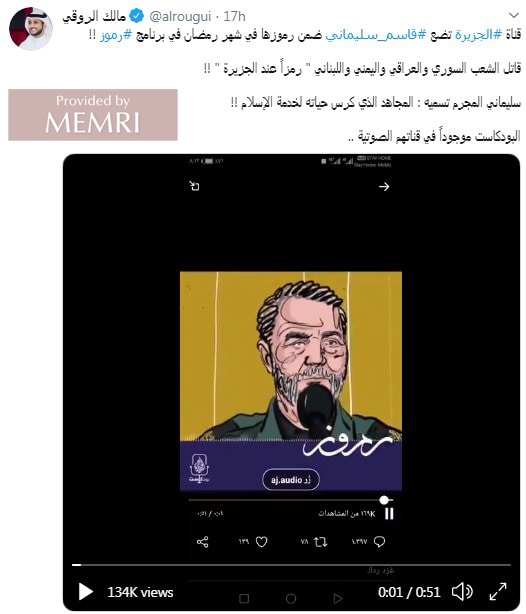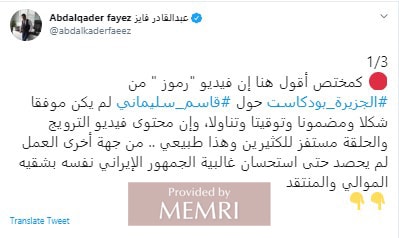The Qatari Al-Jazeera network launched a series of podcasts for Ramadan titled "Rumouz" ("emblematic figures" or "role models"), devoted to leaders and renowned figures in the Arab and Muslim world. Among the figures showcased are Palestinian leader Yasser Arafat, former Syrian president Hafez Al-Assad and former Iraqi president Saddam Hussein, alongside renowned culture figures such as Muslim philosopher Ibn Rushd (Averroes), author and poet Gibran Khalil Gibran and singer Umm Kulthum.
A recently uploaded podcast in the series was dedicated to Qassem Soleimani, commander of the Qods Force of Iran's Islamic Revolutionary Guards Corps (IRGC), who was who was killed in a U.S. airstrike at the Baghdad airport on January 3, 2020. Titled "Soleimani – The Iranian Spearhead," the podcast presents Soleimani as "a soldier and jihad fighter" who "devoted his life to serving Islam" and died a martyr.
This podcast sparked intense criticism against Al-Jazeera and against the Qatari regime, which finances it. The network has long been accused of being pro-Iran. In fact, this bias is one of the reasons for the boycott imposed on Qatar by Saudi Arabia, Bahrain, the UAE and Egypt in 2017, and the podcast was regarded as further evidence of it. The critics described the podcast as evidence that Al-Jazeera has become an Iranian mouthpiece, and its content an affront to all the Sunnis in Iraq, Syria, Lebanon and Yemen who were massacred by the Iranian forces commanded by Soleimani. Especially harsh criticism was voiced by members of the Syrian opposition, which was previously supported by Qatar. They described the podcast as pro-Iranian propaganda and called to boycott Al-Jazeera.
The criticism led Al-Jazeera to remove the podcast from its YouTube channel and from its podcast Twitter page, but it is still available on the Al-Jazeera podcast website.

The podcast on the Al-Jazeera podcasts' Twitter, which was later removed
To hear excerpts from the podcast on MEMRI TV, click here or below:
This report will review the criticism of the Al-Jazeera podcast.
Syrian Oppositionists: This Is Deliberate Pro-Iranian Propaganda; Boycott Al-Jazeera
Harsh criticism of Al-Jazeera was voiced by Syrian oppositionists online. They wondered how this channel, which initially supported the Syrian revolution, could now lavish praise on a commander of the IRGC, which helped Assad suppress the uprising against him. The spokesman of the Syrian High Negotiations Committee (HNC), Yahya Al-'Aridi, wrote: "What is the point of being powerful if you are bereft of any honor or integrity?! Qassem Soleimani has been proved to have been complicit in destroying the lives of hundreds of thousands of Syrians and others. It's a disgrace that [Al-Jazeera], which bore witness to the Syrian's suffering and covered their tragedy [now] presents Soleimani as anything other than a murderer. Even if [Al-Jazeera] apologizes, [its apology] will not be accepted."[1]
Former HNC member Muhammad Sabra wrote on Facebook: "I have never called to boycott any media outlet, regardless of the content it publishes, as long as it conforms to professional standards and upholds human values. But when a media outlet becomes nothing more than a propaganda machine that praises murderers and justifies their crimes, it forfeits the status of a media outlet and sinks to the level of an accomplice to the crimes it justified or whose perpetrators it praised…
"The propaganda video [sic, podcast about Soleimani]… ignores the numerous crimes this criminal committed against the Iranian, Iraqi, Syrian, Lebanese and Yemeni peoples. This hostile propaganda video [sic] violates the professional charter of honor that this channel [Al-Jazeera] purports to uphold... for it does not honor the blood of the thousands of Syrian martyrs who were murdered by this criminal Soleimani…
"Those who control Al-Jazeera, its approach and its editorial policy are a gang of Islamists who regard Iran and Turkey as two parts of the Islamic nation. This editorial policy means that this [podcast] was not a mistake of the producer or the creator of the series. It is an editorial policy that now represents a stance of hostility against the peoples, their rights and the blood of their victims. I therefore call on all the free peoples of the world to boycott this station, which has become the spearhead of aggression against the peoples of the region and a platform for justifying [this] aggression and prettifying it."[2]
A reporter on the Syrian opposition news website Zamanalwsl.net, Maher Sharaf Al-Din, wrote: "The killer of Syria's children, Qassem Soleimani, has been crowned a hero on Al-Jazeera. I [say], with all humility, that, if Al-Jazeera does not issue an official apology for this misstep, which is tantamount to a failure, I will henceforth refuse to appear on [this channel]."[3]
Syrian oppositionist Tamam Abu Al-Khair, editor of the Noonpost website, tweeted on May 11: "Al-Jazeera offended and desecrated the blood of the hundreds of thousands of Arab Spring martyrs killed by Qassem Soleimani. [This is] the same Arab Spring that Al-Jazeera once represented. What a disgrace, even if the [podcast] has since been removed.[4]
Syrian human rights activist Ziad Sheikhani tweeted: "Al-Jazeera, what is the point of your prolonged support of the oppressed, if you eventually glorify the oppressor, criminal and murderer?"[5]
Oppositionist political analyst Khalil Al-Muqdad tweeted on May 12: "What happened to you, Al-Jazeera? Sometimes you promote heresy, and sometimes a Safavi [i.e., Shi'ite Iranian] criminal who massacred Muslims in four Arab countries? That's not like you, and it's not why we liked you, followed you and defended you. Why do you abandon the peoples of the [Arab] peoples?" [6]
SUPPORT OUR WORK

A Syrian oppositionist called "Aram" posted "Iran's new flag, after the [launching] of the Al-Jazeera podcast about Qassem Soleimani," sporting Al-Jazeera's logo in the center.[7]

Aram's tweet
Iraqi Academic: Al-Jazeera Praises My Family's Killer
Criticism of Al-Jazeera was also heard in other countries that suffer from Iranian interference, such as Yemen, Iraq and Lebanon. Iraqi academic 'Aisha Al-'Ani wrote, in a May 12 tweet that went viral: "Al-Jazeera, I am a Sunni Muslim from Iraq. [Qassem] Soleimani's dogs killed my brother and nephew, arrested my cousin and cut the throat of my sister's husband. Soleimani's dogs destroyed our mosque, claiming that it was financed by Qatar – and now you praise him!! Soleimani's dogs raped four women of my family when they detained them in the Kadhimiya women's prison!"[8]

'Aisha Al-'Ani's tweet
Journalist Muhammad Majid Al-Ahwazi, whose name indicates he is from the Iranian region of Ahvaz where there is a Sunni Arab minority, tweeted on May 12: "Al-Jazeera has not removed or apologized for the episode about 'the emblematic figure Soleimani,' in which it glorifies this terrorist, but it did remove the video about the Holocaust, and apologized for it![9] The crimes perpetrated by Soleimani against the Syrians, Yemenis and Iraqis, and even against Iranians, make him an emblematic figure and an Islamic hero in Al-Jazeera's opinion."[10]
Saudi Journalists: Al-Jazeera Is Expressing Support For A Terrorist Who Murdered Sunnis In Syria, Iraq, Yemen, and Lebanon
Saudi journalists also blasted Al-Jazeera for the podcast. Malik Al-Rouqi, director of the MBC news channel, tweeted: "Al-Jazeera devotes [an episode] in its Ramadan series 'Rumouz' to Qassem Soleimani!! The murderer of the Syrian, Iraqi, Yemeni, and Lebanese peoples is an emblematic figure for Al-Jazeera!! [Al-Jazeera] calls the criminal Soleimani a jihad fighter who devoted his life to serving Islam!!..."[11]

Malik Al-Rouqi's tweet
Bassam Al-Lahiani, a sports editor for the Saudi Al-Jazira daily, tweeted: "[Soleimani] is the man who expelled our Sunni brethren from Iraq and Syria and spearheaded the plan [to carry out] terror in the Gulf in order to actualize the Persian aspirations. [The podcast] is not the personal opinion of some [Al-Jazeera] editor, but reflects the ideology of this channel, which sets out the policy of the [Qatari] state."[12]
Likewise, journalist 'Enad Al-'Otaibi, of the Al-Madina daily, tweeted: "[This] terror channel [i.e. Al-Jazeera] supports terrorists when they are alive and glorifies them after their death."[13]
Qatari Oppositionists: Al-Jazeera Has Become A Mouthpiece Of The Iranian Murderers And Criminals
Similar criticism was voiced by Qatari oppositionists. Qatari women's rights activist 'Aisha Al-Qahtani, who left Qatar due to the women's rights situation there, tweeted: "It's a farce! [Soleimani] is a war criminal and terrorist who spilled the blood of many in Syria and Iraq, and then Al-Jazeera comes and lavishes praise on this figure. This reminds us of the media discourse surrounding the terrorists of Al-Qaeda and the Taliban during the war against the Soviet Union [in Afghanistan]."[14]

'Aisha Al-Qahtaini's tweet
Qatari oppositionist Mona Al-Sulaiti commented: "The Al-Jazeera podcast is a moral, media and professional failure. Al-Jazeera has become a mouthpiece of the Iranian murderers and criminals. The Qassem Soleimani podcast burnished [the image] of a criminal who killed hundreds and thousands of Muslims."[15]

Mona Al-Sulaiti's tweet
Director Of Al-Jazeera's Offices In Iran: The Podcast "Was Not Very Good"
Al-Jazeera has so far issued no official response to the criticism over the Soleimani podcast. The network's reporters and presenters, who frequently comment on social media, have also refrained from addressing the issue. An exception was the director of Al-Jazeera's offices in Iran, 'Abd Al-Qader Fayez, who tweeted on May 12: "As a [media] expert, I can say that the video [sic] about Soleimani in Al-Jazeera's 'Rumouz' podcast series was not very good in terms of its form, content, timing, and approach. The video's content... is provocative to many people, and that is natural. But most members of the Iranian public, in both camps – supporters and critics [of the Iranian regime] – did not like it either... The topic of Iran is difficult and complicated, and can deeply polarize our Arab societies, to the extent of accusations of treason. Therefore, anyone wishing to address this issue (whether he is a flagrant supporter of Iran or a flagrant opponent of it), must be aware of this and must possess broad knowledge on this topic, which is explosive, to put it mildly, even if one does not touch it."[16]

One of 'Abd Al-Qader Fayez's tweets
[1] Twitter.com/yahya_alaridi, May 13, 2020.
[2] Facebook.com/mohammad.sabra.5, May 13, 2020.
[3] Twitter.com/mahersharafeddi, May 12, 2020.
[4] Twitter.com/revTamam, May 11, 2020.
[5] Twitter.com/Zshikhani, May 12, 2020.
[6] Twitter.com/Kalmuqdad, May 12, 2020.
[7] Twitter.com/7houran, May 13, 2020.
[8] Twitter.com/Aisha_alanii, May 12, 2020.
[9] See MEMRI Special Dispatch No. 8073, MEMRI Translates Antisemitic Video On Al-Jazeera Network Stating Israel Is Biggest Winner From Holocaust And Uses 'Same Justification' To Annihilate The Palestinians; Following Broad Media Coverage, Including Crediting MEMRI, Al-Jazeera Fires Journalists, Announces 'Bias And Sensitivity Training', May 20, 2019.
[10] Twitter.com/MohamedAhwaze, May 12, 2020.
[11] Twitter.com/alrougui, May 11, 2020.
[12] Twitter.com/bassamho2, May 11, 2020.
[13] Twitter.com/ENAD_Alotaibi, May 11, 2020.
[14] Twitter.com/AishalQahtani, May 12, 2020.
[15] Twitter.com/a21mona, May 12, 2020.
[16] Twitter.com/abdalkaderfaeez, May 12, 2020.




